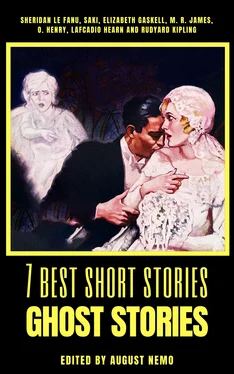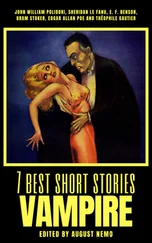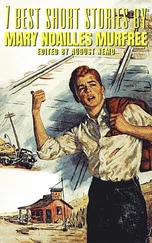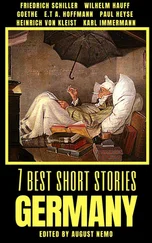Rudyard Kipling - 7 best short stories - Ghost Stories
Здесь есть возможность читать онлайн «Rudyard Kipling - 7 best short stories - Ghost Stories» — ознакомительный отрывок электронной книги совершенно бесплатно, а после прочтения отрывка купить полную версию. В некоторых случаях можно слушать аудио, скачать через торрент в формате fb2 и присутствует краткое содержание. Жанр: unrecognised, на английском языке. Описание произведения, (предисловие) а так же отзывы посетителей доступны на портале библиотеки ЛибКат.
- Название:7 best short stories - Ghost Stories
- Автор:
- Жанр:
- Год:неизвестен
- ISBN:нет данных
- Рейтинг книги:3 / 5. Голосов: 1
-
Избранное:Добавить в избранное
- Отзывы:
-
Ваша оценка:
- 60
- 1
- 2
- 3
- 4
- 5
7 best short stories - Ghost Stories: краткое содержание, описание и аннотация
Предлагаем к чтению аннотацию, описание, краткое содержание или предисловие (зависит от того, что написал сам автор книги «7 best short stories - Ghost Stories»). Если вы не нашли необходимую информацию о книге — напишите в комментариях, мы постараемся отыскать её.
7 best short stories - Ghost Stories — читать онлайн ознакомительный отрывок
Ниже представлен текст книги, разбитый по страницам. Система сохранения места последней прочитанной страницы, позволяет с удобством читать онлайн бесплатно книгу «7 best short stories - Ghost Stories», без необходимости каждый раз заново искать на чём Вы остановились. Поставьте закладку, и сможете в любой момент перейти на страницу, на которой закончили чтение.
Интервал:
Закладка:
Melmoth is the tale of an Irish Gentleman who, in the seventeenth century, obtained a preternaturally extended life from the Devil at the price of his soul. If he can persuade another to take the bargain off his hands, and assume his existing state, he can be saved; but this he can never manage to effect, no matter how assiduously he haunts those whom despair has made reckless and frantic. The framework of the story is very clumsy; involving tedious length, digressive episodes, narratives within narratives, and labored dovetailing and coincidence; but at various points in the endless rambling there is felt a pulse of power undiscoverable in any previous work of this kind--a kinship to the essential truth of human nature, an understanding of the profoundest sources of actual cosmic fear, and a white heat of sympathetic passion on the writer's part which makes the book a true document of æsthetic self-expression rather than a mere clever compound of artifice. No unbiased reader can doubt that with Melmoth an enormous stride in the evolution of the horror-tale is represented. Fear is taken out of the realm of the conventional and exalted into a hideous cloud over mankind's very destiny. Maturin's shudders, the work of one capable of shuddering himself, are of the sort that convince, Mrs. Radcliffe and Lewis are fair game for the parodist, but it would be difficult to find a false note in the feverishly intensified action and high atmospheric tension of the Irishman whose less sophisticated emotions and strain of Celtic mysticism gave him the finest possible natural equipment for his task. Without a doubt Maturin is a man of authentic genius, and he was so recognized by Balzac, who grouped Melmoth with Molière's Don Juan, Goethe's Faust, and Byron's Manfred as the supreme allegorical figures of modern European literature, and wrote a whimsical piece called Melmoth Reconciled, in which the Wanderer succeeds in passing his infernal bargain on to a Parisian bank defaulter, who in turn hands it along a chain of victims until a reveling gambler dies with it in his possession, and by his damnation ends the curse. Scott, Rossetti, Thackeray and Baudelaire are the other titans who gave Maturin their unqualified admiration, and there is much significance in the fact that Oscar Wilde, after his disgrace and exile, chose for his last days in Paris the assumed name of "Sebastian Melmoth."
Melmoth contains scenes which even now have not lost their power to evoke dread. It begins with a deathbed--an old miser is dying of sheer fright because of something he has seen, coupled with a manuscript he has read and a family portrait which hangs in an obscure closet of his centuried home in County Wicklow. He sends to Trinity College, Dublin, for his nephew John; and the latter upon arriving notes many uncanny things. The eyes of the portrait in the closet glow horribly, and twice a figure strangely resembling the portrait appears momentarily at the door. Dread hangs over that house of the Melmoths, one of whose ancestors, "J. Melmoth, 1646," the portrait represents. The dying miser declares that this man--at a date slightly before 1800--is alive. Finally the miser dies, and the nephew is told in the will to destroy both the portrait and a manuscript to be found in a certain drawer. Reading the manuscript, which was written late in the seventeenth century by an Englishman named Stanton, young John learns of a terrible incident in Spain in 1677, when the writer met a horrible fellow-countryman and was told of how he had stared to death a priest who tried to denounce him as one filled with fearsome evil. Later, after meeting the man again in London, Stanton is cast into a madhouse and visited by the stranger, whose approach is heralded by spectral music and whose eyes have a more than mortal glare. Melmoth the Wanderer--for such is the malign visitor--offers the captive freedom if he will take over his bargain with the Devil; but like all others whom Melmoth has approached, Stanton is proof against temptation. Melmoth's description of the horrors of a life in a madhouse, used to tempt Stanton, is one of the most potent passages of the book. Stanton is at length liberated, and spends the rest of his life tracking down Melmoth, whose family and ancestral abode he discovers. With the family he leaves the manuscript, which by young John's time is badly ruinous and fragmentary. John destroys both portrait and manuscript, but in sleep is visited by his horrible ancestor, who leaves a black and blue mark on his wrist.
Young John soon afterward receives as a visitor a shipwrecked Spaniard, Alonzo de Moncada, who has escaped from compulsory monasticism and from the perils of the Inquisition. He has suffered horribly--and the descriptions of his experiences under torment and in the vaults through which he once essays escape are classic--but had the strength to resist Melmoth the Wanderer when approached at his darkest hour in prison. At the house of a Jew who sheltered him after his escape he discovers a wealth of manuscript relating other exploits of Melmoth, including his wooing of an Indian island maiden, Immalee, who later comes into her birthright in Spain and is known as Donna Isidora; and of his horrible marriage to her by the corpse of a dead anchorite at midnight in the ruined chapel of a shunned and abhorred monastery. Moncada's narrative to young John takes up the bulk of Maturin's four-volume book; this disproportion being considered one of the chief technical faults of the composition.
At last the colloquies of John and Moncada are interrupted by the entrance of Melmoth the Wanderer himself, his piercing eyes now fading, and decrepitude swiftly overtaking him. The term of his bargain has approached its end, and he has come home after a century and a half to meet his fate. Warning all others from the room, no matter what sounds they may hear in the night, he awaits the end alone. Young John and Moncada hear frightful ululations, but do not intrude till silence comes toward morning. They then find the room empty. Clayey footprints lead out a rear door to a cliff overlooking the sea, and near the edge of the precipice is a track indicating the forcible dragging of some heavy body. The Wanderer's scarf is found on a crag some distance below the brink, but nothing further is ever seen or heard of him.
Such is the story, and none can fail to notice the difference between this modulated, suggestive, and artistically moulded horror and--to use the words of Professor George Saintsbury--"the artful but rather jejune rationalism of Mrs. Radcliffe, and the too often puerile extravagance, the bad taste, and the sometimes slipshod style of Lewis." Maturin's style in itself deserves particular praise, for its forcible directness and vitality lift it altogether above the pompous artificialities of which his predecessors are guilty. Professor Edith Birkhead, in her history of the Gothic novel, justly observes that "with all his faults Maturin was the greatest as well as the last of the Goths." Melmoth was widely read and eventually dramatized, but its late date in the evolution of the Gothic tale deprived it of the tumultuous popularity of Udolpho and The Monk.
V
THE AFTERMATH OF GOTHIC FICTION
MEANWHILE other hands had not been idle, so that above the dreary plethora of trash like Marquis von Grosse's Horrid Mysteries (1796), Mrs. Roche's Children of the Abbey (1798), Mrs. Dacre's Zofloya; or, the Moor (1806), and the poet Shelley's schoolboy effusions Zastro (1810) and St. Irvine (1811) (both imitations of Zofloya) there arose many memorable weird works both in English and German. Classic in merit, and markedly different from its fellows because of its foundation in the Oriental tale rather than the Walpolesque Gothic novel, is the celebrated History of the Caliph Vathek by the wealthy dilettante William Beckford, first written in the French language but published in an English translation before the appearance of the original. Eastern tales, introduced to European literature early in the eighteenth century through Galland's French translation of the inexhaustibly opulent Arabian Nights, had become a reigning fashion; being used both for allegory and for amusement. The sly humour which only the Eastern mind knows how to mix with weirdness had captivated a sophisticated generation, till Bagdad and Damascus names became as freely strewn through popular literature as dashing Italian and Spanish ones were soon to be. Beckford, well read in Eastern romance, caught the atmosphere with unusual receptivity; and in his fantastic volume reflected very potently the haughty luxury, sly disillusion, bland cruelty, urbane treachery, and shadowy spectral horror of the Saracen spirit. His seasoning of the ridiculous seldom mars the force of his sinister theme, and the tale marches onward with a phantasmagoric pomp in which the laughter is that of skeletons feasting under arabesque domes. Vathek is a tale of the grandson of the Caliph Haroun, who, tormented by that ambition for super-terrestrial power, pleasure and learning which animates the average Gothic villain or Byronic hero (essentially cognate types), is lured by an evil genius to seek the subterranean throne of the mighty and fabulous pre-Adamite sultans in the fiery halls of Eblis, the Mahometan Devil. The descriptions of Vathek's palaces and diversions, of his scheming soweress-mother Carathis and her witch-tower with the fifty one-eyed negresses, of his pilgrimage to the haunted ruins of Istakhar (Persepolis) and of the impish bride Nouronihar whom he treacherously acquired on the way, of Istakhar's primordial towers and terraces in the burning moonlight of the waste, and of the terrible Cyclopean halls of Eblis, where, lured by glittering promises, each victim is compelled to wander in anguish for ever, his right hand upon his blazingly ignited and eternally burning heart, are triumphs of weird colouring which raise the book to a permaneat place in English letters. No less notable are the three Episodes of Vathek, intended for insertion in the tale as narratives of Vathek's fellow-victims in Eblis' infernal halls, which remained unpublished throughout the author's lifetime and were discovered as recently as 1909 by the scholar Lewis Melville whilst collecting material for his Life and Letters of William Beckford. Beckford, however, lacks the essential mysticism which marks the acutest form of the weird; so that his tales have a certain knowing Latin hardness and clearness preclusive of sheer panic fright.
Читать дальшеИнтервал:
Закладка:
Похожие книги на «7 best short stories - Ghost Stories»
Представляем Вашему вниманию похожие книги на «7 best short stories - Ghost Stories» списком для выбора. Мы отобрали схожую по названию и смыслу литературу в надежде предоставить читателям больше вариантов отыскать новые, интересные, ещё непрочитанные произведения.
Обсуждение, отзывы о книге «7 best short stories - Ghost Stories» и просто собственные мнения читателей. Оставьте ваши комментарии, напишите, что Вы думаете о произведении, его смысле или главных героях. Укажите что конкретно понравилось, а что нет, и почему Вы так считаете.

![Коллектив авторов - Best Short Stories [С англо-русским словарем]](/books/26635/kollektiv-avtorov-best-short-stories-s-anglo-thumb.webp)










